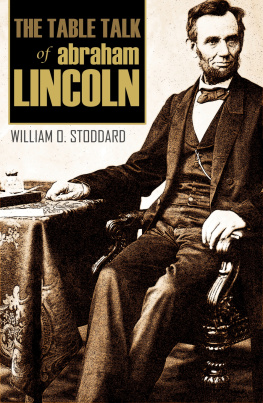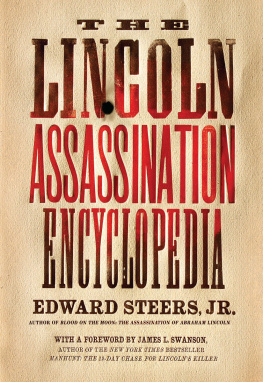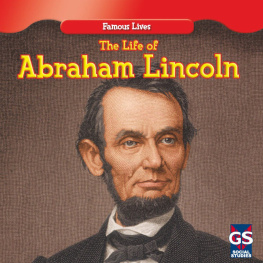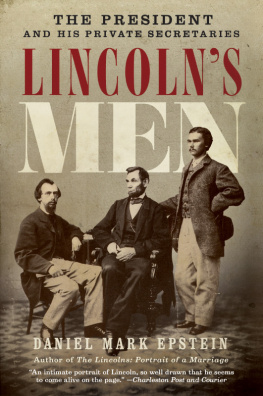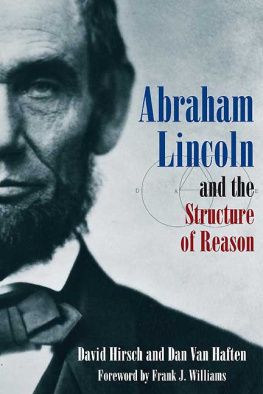
THE
TABLE TALK
OF
ABRAHAM LINCOLN
BY
WILLIAM D. STODDARD,
One of his Private Secretaries
1894
COPYRIGHT 2014 BIG BYTE BOOKS
DISCOVER MORE LOST HISTORY AT BIG BYTE BOOKS.COM
PREFACE
THE history of the world presents us with innumerable instances of men, holding positions of power over current affairs, whose verbal or written utterances were among the apparent forces of the time to which they belonged. With the passing away of the circumstances, the peculiar features of their field of action, a winnowing process becomes at once observable, and much which was at first deemed worthy of preservation is seen to have lost its importance; it has no enduring relation to history or to any probable action to be taken by other men, in later times and under other circumstances. It is not always well to say that the greatness of these men from whose utterances all life departs in this manner, was altogether attached to the greatness of the occasions in which they acted. It may be more nearly true to say that their personalities, however large, were absorbed by the greatness of their circumstances, so that nothing was left for human memory of them when their surroundings passed away.
The list is very short, of men whose words remain in the minds of men for any length of time after the tomb has closed upon their public services, but very prominent in this short list is the name of Abraham Lincoln. He not only did things but said and wrote things which cannot be forgotten. It is entirely probable that, in future crises of the national life which owes so much to him, thoughtful patriots will find themselves going back to the record of his counsels, for wisdom and for strength, as to some well of unselfish patriotism, digged by a patriarch of the Republic in a time of unsurpassed trial and drouth.
In other times, not of trial at all, but of the ordinary life of each successive generation, moreover, there is a certain education, of no small value, to be gained by familiarity with the process of thought and feeling of the man who was enabled to endure so much and to act so well. All smaller and especially all younger patriotisms have much to learn or to acquire from his own, like watches which should be set to keep the true timeif they can.
One measure or indication of the greatness of his personality, separated from the circumstances in which he lived, is to be found in the fact that at this day all men regard him as belonging, now, to the entire nation. During a part of his lifetime, he was nominally the chief of a political party, the foremost figure in a prolonged conflict that was full of the utmost rancor of opposing factions. After that, he became the director of the military and other forces upon one side of a long and sanguinary civil war, and during the years of its continuance and even for a brief period afterwards, the animosities of that terrible struggle seemed to concentrate their bitterness upon him. Nevertheless, few as are the years since the termination of his public services, his name has risen above all that tumult, like a star rising above a subsiding sea, and any idea of partisanship, or even of sectionalism, has faded away from the popular perception of his character.
It is more and more clearly manifest that Lincoln is so readily understood because of the extreme simplicity of his nature and of his consequent action. For example, nobody would deny that he was ambitious, in the sense that ambition is common to all vigorous, aspiring men, but there is a settled and general belief, or rather perception, that anything in the nature of personal or selfish ambition was burned away in the furnace through which he passed and that its idea must now detach from his memory.
Many and important as were the matters and measures he dealt with during the stormy years of his official service, his state papers, properly so called, were few. Hardly one of them falls short, however, of being in itself an important feature in the record of the time, for all were as forces set in action and producing perceptible results. Their condensed style, their freedom from anything like rhetorical ornament, their close connection with public business and its details, render them, for the greater part unavailable for brief quotation purposes. Nevertheless, the popular mind has here and there discovered, severed and preserved wise utterances which have become almost as household words.
Some of Lincolns speeches, before his election as President, possess a similar value for they are at once state papers, generally regarded as such, then and afterwards, and they are also as historical landmarks, measuring periods in the progress of events.
His correspondence, while yet a private citizen, was free but not copious, and the interest attaching to such specimens of it as have been preserved is mainly personal or biographical. After he became the chief magistrate of the nation, he almost ceased to write personal letters, or even to read them. He seemed to have no longer any interests, hardly any thoughts, apart from the duties and endurances of his official position. The few letters that he did write were almost as if they had been addressed to the nation, rather than to individuals, and some of their words may be treasured as public heirlooms.
A study of the utterances which are now regarded as peculiarly expressing his wisdom, his developed character, or his convictions concerning truth, discovers the fact that hardly any of them are of any earlier date than the year 1856. Very nearly all that are of marked Importance belong to the last seven years of his life. They seem to attest that, in comparison with this period, the years of his greatest public service and personal trial, all the years preceding it were short. There were certainly more than forty years that were as youth, as schooling, as varied methods of preparation. Afterwards, the mere almanac-measure became of less account and it is by no means a mere figure of speech to say that he had lived long and was older than other men when he died,at fifty-six.
Wide as was Lincolns fame as an orator, comparatively few of his political speeches were reported. Even the great speech, by some declared his greatest, in its power and consequences, delivered before the Bloomington Convention, in 1856, found no record whatever. It was the beginning of his new career, and, after that, whatever he said was considered worth preserving.
This latter idea soon extended to many sayings which were of a conversational nature, and in dealing with any pointed presentation of them it is necessary to take into consideration the trustworthiness of the hearer who recorded them. By this process, a large mass of materials loosely attributed to Mr. Lincoln has been long since ruled out as, at best, apocryphal. Only such utterances as are believed to be authentic and fairly accurate in form of expression are included in this selection.
WILLIAM O. STODDARD.
OF THE UNION.
MANY of the utterances of Lincoln, both public and private, before and after he became President, and many of his more important public acts, can be better understood after accepting his own repeated assertions of his singleness of purpose. The very breadth of his perception of the nations need and the unswerving character of his own determination, prevented his resulting policy from being either comprehended or approved by a multitude composed of both his friends and his enemies. Eager and enthusiastic men, some of them of great ability, felt sure and freely declared that they would do differently, that is, better, if they were in his place. It is interesting, therefore, at this distance of time, to look back and see how much of his success in contending with manifold obstacles, was due to the fact that he never allowed himself to lose sight, for a moment, of the one paramount duty imposed upon him, the perpetuation of American nationality in its integrity. To this all other things, including the lives of men, white or black, the accustomed forms of statutory law, and even the apparently rigid barriers of the written Constitution, must be regarded as secondary. It is now almost evident that if he had thought and acted otherwise, success would have been impossible. For instance, if he had allowed himself to place the abolition of slavery first, serving a part instead of the whole, then the whole would have been lost, slavery would not have been abolished and the result of the civil war would not have been what it now is, a permanent and forever increasing good to the people of the entire Union, to the South even more than to the North.
Next page
